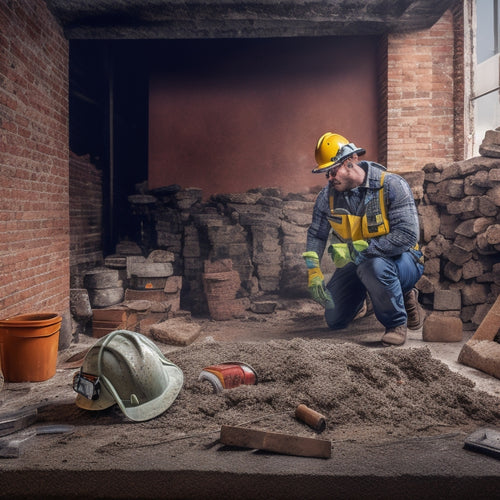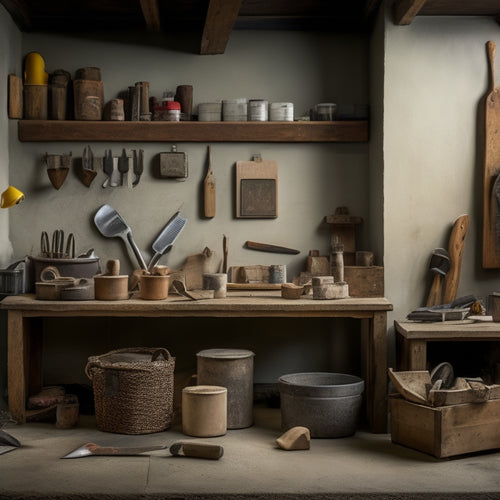
Top Drill for Concrete Wall Renovation
Share
When choosing the top drill for your concrete wall renovation, you'll want to prioritize key features like drill power, vibration control, and ergonomics to guarantee efficient penetration and minimal fatigue. Hammer drills are ideal for heavy-duty projects, while rotary hammers and cordless drills offer versatility and convenience. Consider the type of drill bit you'll need, as diamond core bits and tungsten carbide tips are best for heavy-duty drilling. With top brands like DeWalt, Bosch, and Makita offering advanced technology and precision, you're one step closer to a successful renovation - now, take a closer look at the specific features that'll make all the difference.
Key Takeaways
- Consider the drill's power, vibration control, ergonomics, weight, and heat management when selecting the top drill for concrete wall renovation.
- Choose the right drill type, such as hammer drill, rotary hammer, or cordless drill, based on the project's demands and requirements.
- Select the appropriate drill bit type, such as diamond core bits, masonry bits, or tungsten carbide tips, to ensure efficient and precise drilling.
- Evaluate the drill's features, including motor power, variable speed control, and chuck compatibility, to ensure it meets the project's needs.
- Research top brands, such as DeWalt, Bosch, and Makita, and read user reviews focused on concrete drilling to make an informed selection.
Key Features to Consider
When you're about to drill into a concrete wall for renovation, it's vital to contemplate several key features to guarantee a successful and safe operation. One significant aspect is drill power, which directly affects the drilling speed and efficiency. You'll need a drill with sufficient power to penetrate the concrete without overheating or stalling.
Another essential feature is vibration control. Drilling into concrete can generate intense vibrations, which may cause fatigue, loss of control, or even damage to the drill or the surrounding structure. Look for drills with built-in vibration control mechanisms, such as anti-vibration handles or specialized grip designs, to minimize this risk.
Additionally, consider the drill's ergonomics, weight, and balance. A well-designed drill should fit comfortably in your hand, allowing you to maintain control and precision throughout the drilling process.
Types of Drills for Concrete
You'll need to choose the right drill type for your concrete wall renovation project, and there are several options to evaluate.
You'll have to decide between different concrete drill bit types, such as carbide-tipped or diamond-coated bits, depending on the hardness of the concrete.
Additionally, you'll need to think about whether to use a hammer drill, which is ideal for heavy-duty projects, or a cordless drill, which offers more convenience and portability.
Concrete Drill Bit Types
Your concrete wall renovation project requires the right drill bits to guarantee efficient and accurate drilling. The type of drill bit you choose will greatly impact the overall quality and speed of your project.
There are several types of concrete drill bits available, each designed for specific tasks and materials.
For heavy-duty drilling, diamond core drill bits are ideal. These bits feature a diamond-coated tip that effectively cuts through hard concrete, providing fast and precise holes. They're perfect for large-scale renovation projects or when working with thick concrete walls.
For smaller tasks, masonry bits are a better fit. These bits have a tungsten carbide tip that's designed to withstand the abrasive nature of concrete. They're suitable for drilling anchor holes, installing fixtures, and making small repairs.
Masonry bits come in various sizes and are often used with a hammer drill or rotary hammer. By selecting the correct drill bit for your concrete wall renovation project, you'll guarantee efficient drilling and achieve professional results.
Hammer Drill Options Available
Drilling through concrete walls requires a powerful and capable drill, and hammer drills are the go-to choice for many professionals. You'll find various types of hammer drills on the market, each designed for specific tasks. Rotary hammers, for instance, are ideal for heavy-duty drilling and chiseling, while hammer drills with built-in LED lights are perfect for working in tight spaces.
When choosing a hammer drill, consider the motor power, speed, and torque. Look for drills with high wattage (around 1000W) and variable speed control for best performance. Additionally, consider the type of chuck and whether it's compatible with the drill bits you need.
You'll also want to think about the weight and ergonomics of the drill, as well as the availability of hammer drill accessories, such as drill bits, chisels, and dust collection systems.
Proper drill maintenance is essential to extend the lifespan of your hammer drill. Follow drill maintenance tips such as cleaning the drill regularly, lubricating the chuck, and storing it in a dry place.
Cordless Drill Convenience
Switching to cordless drills can be a revolutionary development for concrete wall renovation projects, offering unparalleled convenience and flexibility.
You'll appreciate the freedom from cords, which can get in the way or limit your movement. With a cordless drill, you can work anywhere, anytime, without worrying about power outlets or cords getting tangled.
Some key benefits of cordless drills for concrete wall renovation include:
- Longer battery life, allowing you to complete tasks without interruption
- Improved weight balance, reducing fatigue and increasing precision
- Increased portability, making it easy to transport your drill to any location
- Reduced maintenance, as cordless drills have fewer moving parts and are less prone to damage
Cordless Vs Corded Drills
When tackling a concrete wall renovation, having the right drill makes all the difference, and the choice between cordless and corded drills is a crucial one.
You'll need to evaluate the benefits of each type to guarantee you're making the right decision for your project.
Cordless drills offer greater mobility and convenience, allowing you to work in tight spaces without the constraint of a power cord. Additionally, they're generally lighter and more ergonomic, reducing fatigue during extended use.
However, you'll need to evaluate battery longevity, as running out of power mid-project can be frustrating and costly. Look for drills with high-capacity batteries and efficient charging systems to minimize downtime.
Corded drills, on the other hand, provide constant power and eliminate the need for battery swaps. They're often more powerful than their cordless counterparts, making them better suited for heavy-duty applications.
However, the cord can limit your movement and create a tripping hazard. When choosing a corded drill, prioritize power efficiency to minimize energy consumption and reduce heat buildup.
Choosing the Right Drill Bits
When selecting drill bits for your concrete wall renovation, you'll need to evaluate the material composition of the bits, as it directly impacts their performance and lifespan.
You'll want to choose bits made from high-quality materials that can withstand the abrasive nature of concrete.
Additionally, you'll need to determine the ideal bit size for your specific drilling tasks to guarantee efficient and accurate results.
Drill Bit Materials Matter
How do you guarantee your drill bits can withstand the demands of concrete wall renovation? The answer lies in the material they're made of.
Drill bit performance and compatibility are vital factors to take into account when choosing the right drill bits for the job.
When it comes to concrete wall renovation, you'll want drill bits that can handle the tough, abrasive nature of concrete. Here are some key material considerations to keep in mind:
-
Tungsten Carbide (TC) bits: Ideal for drilling through concrete, TC bits are extremely hard and resistant to wear and tear.
-
Diamond-coated bits: These bits feature a diamond-coated edge that's designed to tackle tough materials like concrete.
-
High-Speed Steel (HSS) bits: While not as durable as TC or diamond-coated bits, HSS bits are a cost-effective option for lighter concrete drilling tasks.
- Cobalt steel bits: These bits offer a balance between durability and affordability, making them suitable for a range of concrete drilling applications.
Optimal Bit Size Selection
Ideal Bit Size Selection
In selecting the perfect drill bit size for concrete wall renovation, you must consider the specific requirements of your project, bearing in mind the thickness of the concrete, the type of aggregate used, and the desired hole diameter. This guarantees you achieve the correct depth measurement and avoid damaging the concrete or the drill bit.
When choosing a drill bit, consider the bit compatibility with your drill and the type of concrete you're working with. For example, a bit with a tungsten carbide tip is suitable for drilling through hard concrete, while a bit with a diamond-coated edge is better for drilling through abrasive concrete.
The bit size also affects the drilling speed and efficiency. A larger bit requires more power and may lead to slower drilling speeds, while a smaller bit may drill faster but may not provide the desired hole diameter.
Safety Precautions and Tips
While renovating a concrete wall, you're likely to encounter hazardous materials, heavy machinery, and physically demanding tasks, making safety precautions essential to prevent injuries and guarantee a successful project.
To secure your safety, make sure to:
-
Wear personal protective equipment (PPE) such as gloves, safety glasses, and a dust mask to protect yourself from debris and dust.
-
Implement site preparation techniques like clearing the area, covering floors and surfaces, and securing loose objects to prevent tripping hazards.
-
Ensure proper ventilation to prevent inhaling dust and fumes from drilling and cutting concrete.
- Regularly inspect your drill and accessories for damage or wear, and replace them as needed to prevent accidents.
Top Brands for Concrete Drills
With your safety gear in place and site preparation complete, you're ready to tackle the concrete wall renovation. Now, it's time to focus on the right drill for the job. When it comes to concrete drilling, you need a reliable and powerful tool that can withstand the demands of the task.
Top brands like DeWalt, Bosch, and Makita offer high-performance drills designed specifically for concrete drilling. DeWalt's drills are known for their durability and speed, while Bosch's models boast advanced technology and precision. Makita's drills, on the other hand, are praised for their compact design and ease of use.
When choosing a drill, consider factors like power output, speed, and ergonomics. Read user reviews and compare brands to find the best fit for your needs.
Look for reviews that mention concrete drilling specifically, as this will give you a better idea of the drill's performance in real-world applications. By doing your research and selecting a reputable brand, you'll be well on your way to a successful concrete wall renovation.
Frequently Asked Questions
Can I Use a Drill for Concrete on Other Masonry Materials?
You can use a drill for concrete on other masonry materials, but it's essential to choose the right drill type for the specific material, as different masonry materials require unique drill bits and techniques to avoid damage.
How Often Should I Lubricate the Drill Bits for Optimal Performance?
You might think lubrication is a hassle, but trust us, it's essential for best performance. To extend drill bit lifespan, you'll want to lubricate them regularly, especially when drilling through dense materials, using techniques like misting or applying lubricant sticks during drill maintenance.
What Is the Recommended Drill Speed for Concrete Drilling?
You'll want to adjust your drill speed according to the drill type and concrete hardness. Typically, for hammer drills, use low to medium speed settings (300-600 RPM) for ideal control and reduced bit wear, while rotary drills can handle higher speeds (1,000-1,500 RPM).
Can I Use a Hammer Drill for Mixing Concrete or Mortar?
Back in the medieval castle days, you wouldn't mix mortar with a hammer drill, but today, you can! Though not ideal, you can use a hammer drill for mixing concrete or mortar, but be cautious of over-mixing and employ gentle, controlled mixing techniques to avoid damaging the material.
Are Drill Bits for Concrete Compatible With All Drill Brands?
You'll find that most drill bits for concrete are compatible with various drill brands, but it's essential to match the bit type with your drill's chuck size and concrete drilling techniques, ensuring best performance and safety.
Conclusion
As you stand amidst the dust and debris of your concrete wall renovation, you're not just holding a drill - you're wielding a mighty hammer of progress. With the right tool in hand, you're an unstoppable force, shattering obstacles and forging a path to a brighter, more modern space. The concrete trembles before you, and with each triumphant drill stroke, you're one step closer to victory.
Related Posts
-

7 Must-Have Safety Gears for Brick Wall Renovation
When renovating a brick wall, you'll face a multitude of hazards, making it essential to wear and use the right safet...
-

Affordable Plastering Tools for Home Renovation Success
You're taking the first step towards a successful home renovation by investing in the right plastering tools. Start w...
-

3 Beginner-Friendly Tools for Plaster Renovation Success
You'll be glad to know that the three essential tools you need for a successful plaster renovation are the same ones ...


